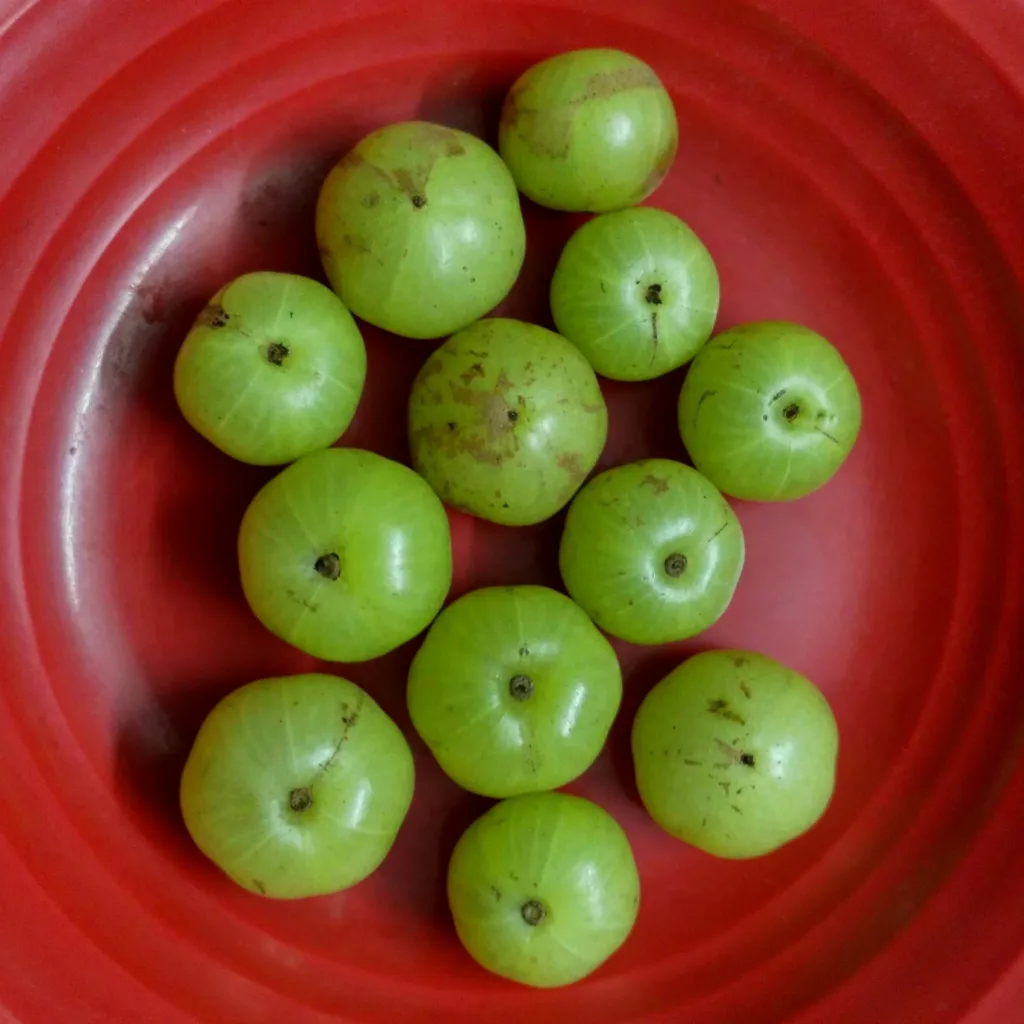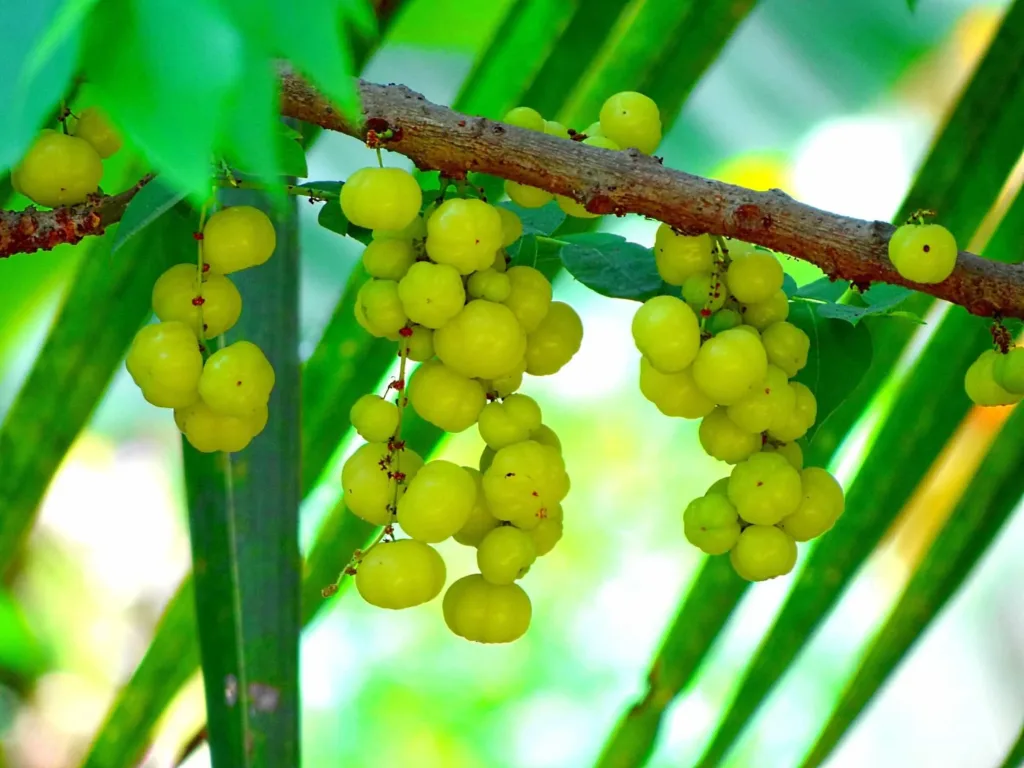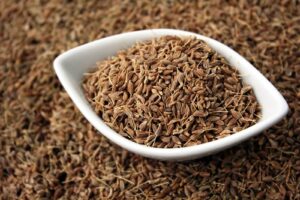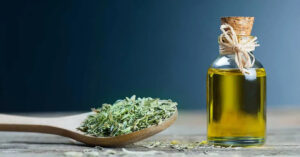The fruit amla, commonly referred to as Indian gooseberry, has a long history that is ingrained in Indian culture and traditional medicine. It acquires long-standing significance from the fact that its Sanskrit name, “Amalaki,” is recorded in ancient books like the 1000 BCE Charaka Samhita. The Hindu creator god Lord Brahma is said to have shed tears while meditating on Lord Vishnu, which is how the amla tree got its start. The fruit’s revered status is further highlighted by this link with deity.

An essential component of Ayurveda, the age-old Indian medical system, is amla. It has been dubbed “Dhatri,” which means “nurse” or “sustainer of life,” due to its great medicinal qualities.
For centuries, Ayurvedic doctors have used amla to treat a variety of illnesses, from respiratory problems to digestive difficulties. Because of its high vitamin C content and strong antioxidant qualities, it is highly valued as a cure for enhancing general health and lifespan.
Beyond its therapeutic uses, amla has a rich historical background. It has been used in Indian cooking for a long time in a variety of pickles, preserves, and meals. Indian food gains a distinctive depth from its characteristic sour and astringent flavour. Amla is also a holy food, frequently offered in Hindu rites and rituals.
Chemical Composition Of Amla
Carotene and ascorbic acid (vitamin C) are abundant in amla fruit. Many polyphenols, including luteolin, corilagin, apigenin, quercetin, gallic acid, and ellagic acid, are present in it. The table below provides the estimated proximate composition of Amla:
| Component | Content (per 100 g) |
|---|---|
| Carbohydrate | 10 g |
| Fiber | 4.3 g |
| Calcium | 25 mg |
| Magnesium | 10 mg |
| Protein | 0.80 g |
| Fat | 0.50 g |
| Total calories | 44 Kcal |
| Iron | 0.31 mg |
| Potassium | 198 mg |
| Zinc | 0.12 mg |
Benefits Of Amla
Indian gooseberry, or amla, is a nutritional powerhouse that is highly regarded for its plethora of health advantages. Due to its exceptional qualities, Ayurveda, the traditional Indian medical system, considers it to be very important.
Amla Prevents Cancer :
Amla is a powerful antioxidant, with over 20 times the amount of vitamin C as oranges. By scavenging free radicals, this strong antioxidant shields cells from harm and lowers inflammation.
Diabetes Management :
Amla berries contain soluble fibre that dissolves fast in the body to help cut down the pace at which your body absorbs sugar. This may lessen rises in blood sugar. For those with type 2 diabetes, amla berries also improve lipid profiles and blood glucose levels.
Lowers Cholesterol and Improves Heart :
Health Consuming amla has been associated in studies to strengthen the immune system, lower cholesterol, and improve heart health.
Preserves Good Skin And Vision :
Amla is also a veritable gold mine of other vital minerals, such as calcium, iron, vitamin A, and vitamin E. These nutrients support many facets of health, from strong bones and prevention of anaemia to preserving good skin and vision.
Helps In Gout And Arthritis:
Additionally, amla has strong anti-inflammatory qualities, which makes it a useful treatment for gout and arthritis.
Promotes Bowel Movement :
Additionally, it helps the digestive system by promoting healthy bowel movements and reducing constipation which may help alleviate symptoms of Irritable Bowel Syndrome
Good for healthy skin and hair :
Its high vitamin C concentration encourages the formation of collagen, which is necessary to preserve skin suppleness and minimise wrinkles. Amla is also well recognised for fortifying hair follicles, which helps to both prevent and encourage healthy hair growth.
In nutshell , amla is a true superfood with a wide range of health benefits. Its rich nutritional profile, antioxidant power, and anti-inflammatory properties make it an invaluable addition to a healthy diet and lifestyle.
Amla Helps In Polycystic Syndrome :
Amla preserves hormonal equilibrium and aids in the removal of toxins from the body during the menstrual cycle, both of which naturally increase a woman’s ability to conceive.
Amla Helps Improve Mental Health:
The antioxidants in amla berries have a potent ability to quench free radicals, which helps protect brain tissue and improve memory. This may be the cause of Amla’s effectiveness in treating dementia patients.
Heps In Weight Loss :
A sluggish metabolism may be the cause of the fat buildup. Unwanted fat accumulation can result from irregular eating patterns. Amla aids in eliminating toxins from the body and aids in preventing the creation of fat. For weight loss, consuming fresh Amla, sweets, and Amla powder with lukewarm water is often advised.
Various names of Amla :
Amla is known by different names in different parts of the country :
| Language | Name |
|---|---|
| Sanskrit | Amalaki, Shriphala, Sheetaphala, Dhatri, Tishyaphala |
| Hindi | Amla |
| Marathi | Avala |
| English | Indian Gooseberry |
| Kannada | Nelli |
| Tamil | Nellikai |
| Telugu | Usheeri kaya |
| Malayalam | Nelli |
Ways to consume
Indian gooseberry, or amla, can be consumed in a number of ways to suit individual tastes and cooking experiences. Its adaptability makes it easy to include its nutrient-dense goodness in your diet.
1.Raw Consumption:
Amla can be consumed raw if you want the pure, natural flavour. Some may find its strong astringent and sour taste overwhelming, yet it delivers a powerful nutritional boost.

2.Juice:
Amla juice is a well-liked option since it provides an intense amount of antioxidants and vitamin C. To counteract the tartness, dilute the juice with water or other fruit juices.
3.Powder:
Amla powder is a versatile ingredient, easily added to smoothies, yogurt, or even baked goods. It provides a convenient way to incorporate amla’s benefits into various dishes.
4. Pickles & Preserves:
Amla is a fruit whose flavour profile is altered by traditional Indian pickles and preserves. The preserves give sweetness and the pickling procedure balances the sourness.
5. Chutneys & Sauces:
Amla chutneys and sauces provide savoury foods a zesty touch. They go well with rice dishes, sandwiches, and curries.
6. Hair and Skin Care:
Popular treatments for fostering healthy scalps and hair growth include amla oil and hair masks. Because of its antioxidant properties, amla extracts are also present in a number of skincare products.
Prior to including amla in your diet, always get medical advice, especially if you have any underlying medical concerns.
Precautions
While eating amla, or Indian gooseberry, is usually regarded as healthy, there are a few things to watch out for to make sure you’re consuming it safely and healthily.
1.See an Expert:
Prior to ingesting amla, speak with your healthcare professional if you have any underlying medical issues, such as diabetes, blood disorders, or are pregnant or nursing a child.
2.Keep an eye on Your Blood Sugar:
Amla has the potential to reduce blood sugar. When adding amla to their diet, people with diabetes should pay special attention to their blood sugar levels.
3.Avoid Excessive Consumption :
An excessive amount of amla consumption might cause constipation or diarrhoea, thus it’s best to avoid it. Start out little and increase consumption gradually in accordance with tolerance.
4.Take Care of Drug Interactions:
Amla may cause problems when taken with some drugs, especially those that thin the blood. Tell your physician that you consume amla in order to prevent any possible interactions.
5. Avoid When You’re Coughing or Have a Kapha Imbalance:
According to Ayurveda, amla aggravates the Kapha dosha, which can make cold or cough symptoms worse. Steer clear of amla in these circumstances.
6. Avoid Pairing with Ghee or Jaggery:
The acidic taste of amla might exacerbate Pitta dosha. Consuming it alongside ghee or jaggery, which are thought to be Pitta-pacifying, will counteract its effects.
7. Watch Out for Any Allergic Reactions:
Although they are uncommon, allergic responses to amla can happen to some people. If any side effects appear, stop taking it and get medical help.
You can safely enjoy the many health advantages of amla while reducing any potential hazards by taking these steps.
Disclaimer : Consult a Physician before consuming if you any have a medical condition or prone to allergies.
References: http://www.wikipedia.com







